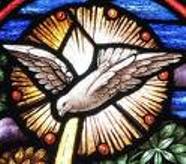Ahhh, language, what a beautiful thing!
The issue of
“gender neutral” language in the liturgical setting seems to me, to be one of the proverbial
“lines in the sand” between orthodox and progressive Catholics. My friends over at
Cleansing Fire have posed some interesting questions, so as to not hijack the “com box’ there, I give you my humble opinions on the matter here.
In some respects, I believe this whole debate is a bunch of malarkey!
Jesus was a man, there is no way around that, and whenever we refer to him, it should be as a man!
God, however, is neither male nor female, as we were both created in God’s image. God is more than that. In the relational aspect, God was Jesus’ father therefore that is how Jesus referred to God.
For me, that is also my image of God, as a loving, patient, father, waiting for me to
“come home”. For others, though, that may not be the image of
“father” that they have. Their image of father may be one of fear and intimidation and
I don’t expect that is how God would want someone to feel about Him.
I pray the Liturgy of the Hours, in the format that most priest and deacons do, which was written by men and for men. When I read the word
“men” as it relates to the community or the world, I do not see just the male of the species, but all of human kind, because I know that up until about 30 years ago, this was an accepted practice! We did not get so wrapped up in the
“what you said vs. what you meant” mentality.
(Which is a whole other post!)
And then there is the Holy Spirit. I have heard the Spirit referred to as the
“wisdom of God”. Well, in Greek, a language that many of our Latin translations come from, wisdom was personified as a woman,
Sophia. Again, is there any reason to
“box” in the Holy Spirit to one gender? If the Holy Spirit is the
“essence” of God’s unfathomable wisdom, love and mercy, is it right to say that it must be
either/or?
For me, this is all a very personal issue and depends on my relationship with God. That said, I do believe that we need to have some
“structure” as to our liturgical practices. My idea of how to
“bridge the gap” between the two sides is this…
When referring to a specific person, Jesus, Mary, one of the apostles, saints, etc., use the specific pronoun.
When referring to God, unless it is in direct relation to Jesus’ relationship, leave off the qualifier. (
God, the father, we ask that you hear our prayer…) We acknowledge the relationship when we end our prayer,
“We ask this through Jesus Christ, your son…, without using
“gender specific language”
The Holy Spirit is a tough one. In the Creed, when I pray it privately, I use the feminine pronoun to refer to the Holy Spirit
(“with the Father and Son she is worshiped and glorified, she has spoken through the prophets…”). I guess it depends on my mood at Mass, and where I am, if I say it there, and if I do use the feminine pronoun, it is barely audible, as I do not want to offend anyone around me. I am not sure what I would do in this case, and am glad that I do not have to make the decision.
Which brings us to the most important thing, ultimately, it is up to the Church to decide on translations. This, from my understanding, is a very daunting and intimidating task, as many words have more than one meaning, and we cannot always be sure of context, syntax, grammar, etc.
I (we) can only pray that the people whose job it is to do these things act out of the knowledge that we all, male and female, were created in the image of a loving, benevolent, merciful God and that to use language to diminish that all encompassing love is, in my humble opinion, wrong.
Peace to All!
